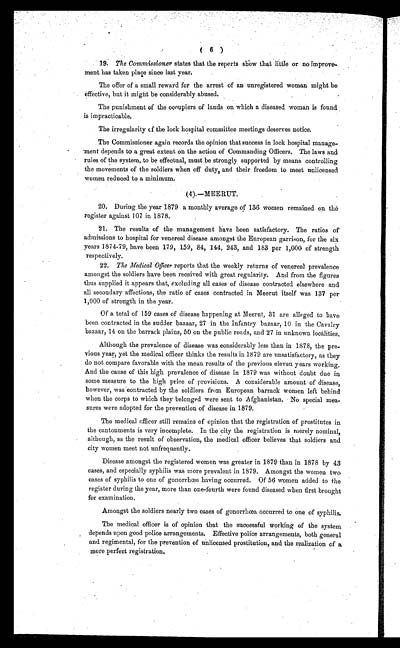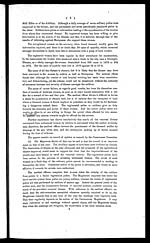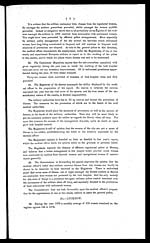Medicine - Institutions > Lock hospitals > Annual report on the working of the lock hospitals in the North-Western Provinces and Oudh > Sixth annual report of the working of the lock hospitals in the North-Western Provinces and Oudh, for the year 1879
(196) Page 6
Download files
Individual page:
Thumbnail gallery: Grid view | List view

( 6 )
19. The Commissioner states that the reports show that little or no improve-
ment has taken place since last year.
The offer of a small reward for the arrest of an unregistered woman might be
effective, but it might be considerably abused.
The punishment of the occupiers of lands on which a diseased woman is found
is impracticable.
The irregularity cf the lock hospital committee meetings deserves notice.
The Commissioner again records the opinion that success in lock hospital manage-
ment depends to a great extent on the action of Commanding Officers. The laws and
rules of the system, to be effectual, must be strongly supported by means controlling
the movements of the soldiers when off duty, and their freedom to meet unlicensed
women reduced to a minimum.
(4).—MEERUT.
20. During the year 1879 a monthly average of 136 women remained on the
register against 107 in 1878.
21. The results of the management have been satisfactory. The ratios of
admissions to hospital for venereal disease amongst the European garrison, for the six
years 1874-79, have been 179, 159, 84, 144, 243, and 183 per 1,000 of strength
respectively.
22. The Medical Officer reports that the weekly returns of venereal prevalence
amongst the soldiers have been received with great regularity. And from the figures
thus supplied it appears that, excluding all cases of disease contracted elsewhere and
all secondary affections, the ratio of cases contracted in Meerut itself was 137 per
1,000 of strength in the year.
Of a total of 159 cases of disease happening at Meerut, 31 are alleged to have
been contracted in the sudder bazaar, 27 in the Infantry bazaar, 10 in the Cavalry
bazaar, 14 on the barrack plains, 50 on the public roads, and 27 in unknown localities.
Although the prevalence of disease was considerably less than in 1878, the pre-
vious year, yet the medical officer thinks the results in 1879 are unsatisfactory, as they
do not compare favorable with the mean results of the previous eleven years working.
And the cause of this high prevalence of disease in 1879 was without doubt due in
some measure to the high price of provisions. A considerable amount of disease,
however, was contracted by the soldiers from European barrack women left behind
when the corps to which they belonged were sent to Afghanistan. No special mea-
sures were adopted for the prevention of disease in 1879.
The medical officer still remains of opinion that the registration of prostitutes in
the cantonments is very incomplete. In the city the registration is merely nominal,
although, as the result of observation, the medical officer believes that soldiers and
city women meet not unfrequently.
Disease amongst the registered women was greater in 1879 than in 1878 by 43
cases, and especially syphilis was more prevalent in 1879. Amongst the women two
cases of syphilis to one of gonorrhœa having occurred. Of 56 women added to the
register during the year, more than one-fourth were found diseased when first brought
for examination.
Amongst the soldiers nearly two eases of gonorrhœa occurred to one of syphilis.
The medical officer is of opinion that the successful working of the system
depends upon good police arrangements. Effective police arrangements, both general
and regimental, for the prevention of unlicensed prostitution, and the realization of a
more perfect registration.
Set display mode to: Large image | Zoom image | Transcription
Images and transcriptions on this page, including medium image downloads, may be used under the Creative Commons Attribution 4.0 International Licence unless otherwise stated. ![]()
| Permanent URL | https://digital.nls.uk/75111420 |
|---|




